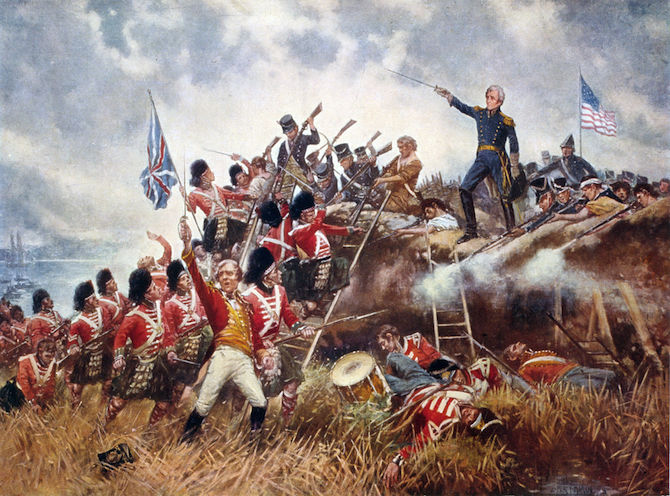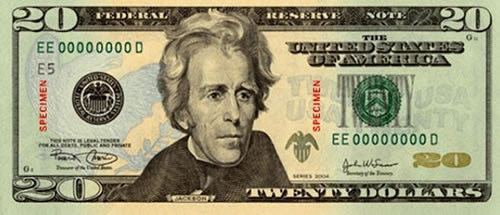Early Life
Andrew Jackson was born in South Carolina on March 15, 1767. He was the third son of Andrew and Elizabeth Jackson, immigrants from Northern Ireland. Jackson's father died days before he was born. As a youngster, Jackson experienced no formal education but spent several years reading and studying law. At the age of 20 he was admitted to the bar. In 1788, he was appointed public prosecutor of the western district of North Carolina. He would soon settle in Nashville, Tennessee, and become a successful lawyer.
Defending the Honor of His Wife
In Tennessee, Jackson met Rachel Donelson Robards who would eventually become his wife. At the time Rachel was married to Captain Lewis Robards, whose bad temper had driven Rachel home to live with her mother who happened to be Jackson's landlady. They were married in 1791. Jackson and Rachel believed that Captain Robards had received a legal divorce by the Virginia legislature, but the marriage was not officially dissolved until 1793. This stunned the righteous Jackson and the couple was properly remarried in 1794. Jackson's enemies would claim that he stole another man's wife and lived with her for three years. These claims did not sit well with Jackson and often invoked his famous temper. Jackson killed Charles Dickinson, a fellow lawyer, in a pistol duel for insulting Rachel. As Jackson continued to prosper in Tennessee, he built his famous mansion, the Hermitage, near Nashville.
War of 1812
Andrew Jackson was commissioned as brigadier general and then major general in the War of 1812. On November 7, 1814, Jackson drove the British from Florida and captured the town of Pensacola. He became a national hero when he defeated the British in the Battle of New Orleans. The British sustained 2,000 dead and injured while Jackson sustained only six casualties. The Battle of New Orleans would be the last battle of the war. On December 24, 1814, the Treaty of Ghent was signed, which called for the end of the war to take effect in February of 1815. Jackson would next drive the Seminole Indians from Florida in 1818.
 |
| Andrew Jackson Commanding Soldiers at the Battle of New Orleans |
Jackson Thought he Should be the 6th President!
On March 4, 1823, Andrew Jackson was elected senator of Tennessee. The next year, he ran for the Presidency of the United States. His opponent in the election was John Quincy Adams. Neither Jackson nor Adams won the majority vote, and the election was to be determined in the House of Representatives. Henry Clay, who lost the presidential election, was still the speaker of the House of Representatives. Clay was a friend and advocate of Adams and lobbied hard for his election. Adams eventually won and appointed Clay to be his secretary of state. Jackson and his supporters cried foul. They believed that corruption, thievery, and crooked politics had cost him the election. These events would drive Jackson's campaign in 1828.
Landslide victory
In 1828, Jackson won the election by a landslide and became the nation's seventh president. He was seen as the people's president. He received 178 electoral votes to Adams' 83. Jackson wasted no time in putting his mark on the presidency. Jackson claimed that the old corrupt politicians had to go. He removed almost the entire old regime and replaced them with people he chose. In 1828, however, Rachel died and Jackson became depressed.
South Carolina Incurs Jackson's Wrath
Jackson believed in the national government and its ability to impose tariffs. South Carolina attempted to nullify the tariffs of 1828 and 1832 that the federal government imposed. South Carolina, like much of the south, was angry that the tariffs would result in higher prices on goods that weren't manufactured in the south. Jackson, in his typical style, threatened to send in federal troops to enforce compliance with the law. Henry Clay's Compromise of 1833 prevented final confrontation.
Indian Removal and Trail of Tears
Andrew Jackson is perhaps best known for his Indian removal programs. In 1830, Jackson signed the Indian Removal Act, which authorized Congress to purchase Indian lands in the east in exchange for unsettled land in the west. Jackson's actions were particularly popular in the south, as gold had been discovered on Cherokee lands in Georgia. Jackson pressured Cherokee leaders to sign a removal treaty (known as the Treaty of New Echota) that was surely rejected by most Cherokee people. The treaty, which was enforced by Martin Van Buren (the next president), resulted in the removal of the Cherokee Indians from their native lands via the Trail of Tears. The Cherokee were forced to walk hundreds of miles from Georgia to present-day Oklahoma. Thousands died along the way. In all, more than 45,000 Indians were removed during Jackson's administration.
Death
Andrew Jackson retired to his mansion in Tennessee after his second term. He died on June 8, 1845, at the Hermitage.
 |
| Andrew Jackson on the United States $20 Bill |